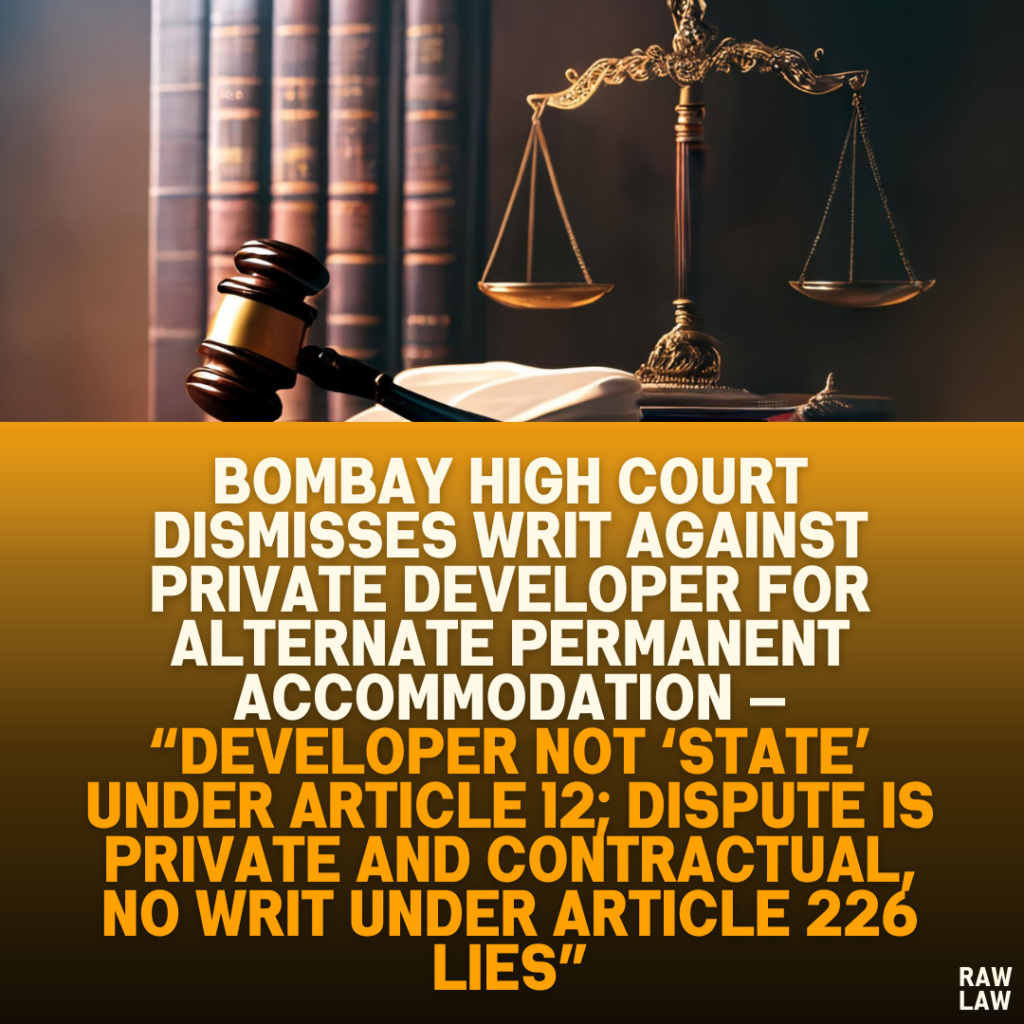Court’s Decision
The Bombay High Court dismissed a writ petition seeking directions against a private developer for executing individual supplementary agreements for alternate permanent accommodation and compensation. The Court held that:
“The reliefs sought in this Writ Petition are directed against a developer who does not fall within the ambit of ‘State’ under Article 12 of the Constitution of India.”
The Court found that the dispute was essentially private and contractual in nature and therefore not maintainable under Article 226 of the Constitution. It declined to exercise its writ jurisdiction and dismissed the petition without costs.
Facts
The petition was filed by tenants of a redeveloped building seeking multiple reliefs:
- A writ of mandamus directing the developer to execute supplementary agreements for alternate permanent accommodation.
- Monthly compensation of ₹10,000 per petitioner under Clause 15 of the Agreement dated 17 June 2014.
- Direction for the registration of a co-operative society to facilitate further redevelopment.
- Contempt action against members of the High Power Committee (HPC) for non-compliance with a prior court order dated 16 July 2019.
The petition was primarily directed against the developer, Alliance Infracorp Developer, and included public bodies such as MHADA and the Municipal Corporation as respondents.
Issues
- Whether a writ petition under Article 226 of the Constitution is maintainable against a private developer.
- Whether the developer performs public functions or falls within the ambit of “State” under Article 12 of the Constitution.
Petitioner’s Arguments
The petitioners contended that the writ petition was maintainable under Article 226. They relied on several Supreme Court and High Court decisions, including:
- Andi Mukta Sadguru Shree Muktajee Vandas Swami Suvarna Jayanti Mahotsav Smarak Trust v. V.R. Rudani (1989) 2 SCC 691
- Board of Control for Cricket in India v. Cricket Association of Bihar (2015) 3 SCC 251
- Sushila Gordhandas Parikh v. State of Maharashtra 2023 SCC OnLine Bom 1781
- Praga Tools Corporation v. C.A. Imanual (1969) 1 SCC 585
They argued that the developer’s obligations, particularly under the Intimation of Disapproval (IoD), had public elements and should fall within writ jurisdiction.
Respondent’s Arguments
MHADA and the developer raised a preliminary objection, contending that the petition was not maintainable as it involved private contractual obligations and not public law elements. They emphasized that the developer did not qualify as “State” under Article 12 and was not discharging any public function or statutory duty.
Analysis of the Law
The Court carefully distinguished the judgments cited by the petitioners. It noted:
- Andi Mukta and BCCI cases involved entities performing public functions or receiving substantial State aid.
- Sushila Gordhandas Parikh involved extreme circumstances involving senior citizens being denied rent, which was not the case here.
- Praga Tools was held inapplicable as it dealt with entities governed by statutory frameworks.
None of these authorities, in the Court’s view, supported the maintainability of a writ against a private developer in this context.
Precedent Analysis
The Court placed reliance on the Supreme Court judgment in Shalini Shyam Shetty & Anr. v. Rajendra Shankar Patil (2010) 8 SCC 329, which emphasized that:
“The High Courts should refrain from entertaining disputes between private parties through Writ Petitions under Article 226 of the Constitution.”
This binding precedent formed the basis of the Court’s rejection of the petition.
Court’s Reasoning
The Court found that the developer neither discharged public duties nor received State aid that could classify it as a “State” authority under Article 12. It emphasized:
- The developer is a private entity with no statutory obligations.
- The dispute is contractual in nature, involving enforcement of terms under a development agreement.
- No public law element was involved to justify invocation of Article 226 jurisdiction.
Conclusion
The Court held that:
“The disputes raised in the Petition are essentially private in nature, involving contractual obligations and rights between the parties. Such disputes do not warrant the exercise of this Court’s writ jurisdiction under Article 226.”
Accordingly, the writ petition was dismissed with no order as to costs.
Implications
This judgment reaffirms the limited scope of writ jurisdiction under Article 226 in matters involving private parties and contractual disputes. It clarifies that unless a private party performs a public function or is under statutory obligation, relief against it cannot be sought via a writ petition. The ruling serves as a precedent for future redevelopment and real estate disputes, drawing a clear boundary between public law and private law remedies.



